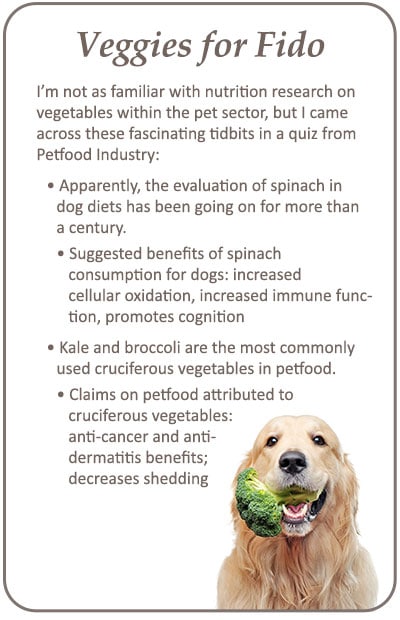
Trend or fad?
A recent blog in Petfood Industry had editor-in-chief, Debbie Phillips-Donaldson, pondering whether plants and plant protein would be the next big thing in petfood. Naturally, as an advocate for adding fruit in petfood and treats, this caught my attention. Ms. Donaldson gave examples of existing brands offering plant-based pet food (V-Planet, Natural Balance), startups with plant-based and vegan products (sweet potato/peanut butter), alternative proteins (microalgae, insects) and more.
While laying out the case for plant-based petfood, she pointed to increasing consumer interest in plant-based products – not vegetarian or vegan – and their benefits. It makes total sense to look at general consumer buying patterns, because of course, people are buying petfood not cats and dogs. As we’ve seen time and again, pet parents buy the same type of products for their pets as they do for themselves. People are drawn to eating plant-based products because of their perceived healthfulness, and they want the same healthy products for their beloved pets.
Sustainability is important among all groups when buying food and beverage products
Frankly you can’t look at any trade food news publication today without seeing at least one article featuring plant-based protein. Plant-based protein is appealing to people not only for its nutritional value, but also as a more sustainable source of protein than animal protein. On that note, a recent online consumer survey conducted by C.O. nxt. in conjunction with Menu Matters found that 80% of respondents said sustainability is important to some degree when buying food and beverage products. And while sustainability was important among all groups, it was highest among 18- to 44-year-olds. This shows the pandemic has not pushed sustainability out of the consumer consciousness and reinforces its importance as a purchase driver.
Missing nutrition link
There’s no doubt interest and nutrition research in plant-based protein is well-established in people food, but is there nutritional evidence to support its use in petfood? Like Ms. Phillips-Donaldson, I agree that the likelihood of cats thriving on plant-based diets is slim to none. They are after all carnivorous. Dogs, on the other hand, are omnivores, so it would seem dog food is ripe for plant-based innovation. Yet, most of the nutritional support for plant-based ingredients for animals is ‘borrowed’ from human nutrition studies. That means obviously, there’s lots of opportunity for nutritional research on plant-based diets in canines. And while there’s still much nutritional investigation to be done regarding the effects of fruit and vegetable consumption in dogs, there’s definitely evidence that plant-based ingredients can provide health benefits. In an earlier blog, I covered a webinar on the nutritional benefits of fruit in pet food formulations, namely fiber and antioxidants. I’d be remiss if I didn’t mention vegetables too, provide a cornucopia of nutritional benefits.

The science is still developing around the efficacy of plant-based ingredients in petfood, but I believe fruit and other plant ingredients will only continue to grow in the petfood space. As people hear more about the benefits of eating fruit and vegetables for themselves, they’ll want to ensure their pets are also eating healthfully. Does this mean animal protein will be abandoned? No, not at all. Animal protein will retain its primacy. It just means the market is dynamic and the trend in plant-based will continue to evolve along with the availability of ingredients and the nutrition science.
If all this discussion about plant-based ingredients has you thinking about exploring some applications, contact us here at Tree Top.
If you’d like the added benefits of using fruit in your formulation, we can help. Tree Top’s fruit powders (apple, pear, and plum) offer a wide range of benefits including:
- Flavor Enhancement
- Improved humectancy
- Control water activity
- Increased yield
- Fat reduction
- Extended shelf-life for baked goods
- Microbial inhibitor
- Antioxidant




